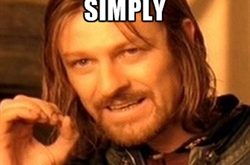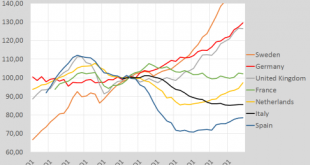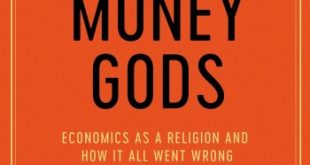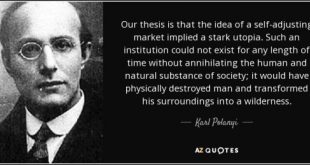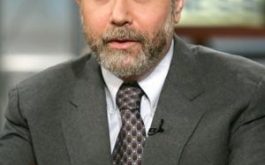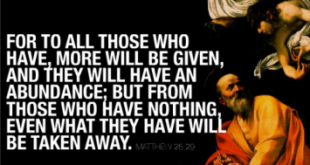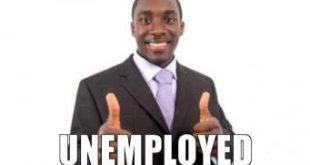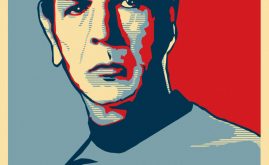Are methodological discussions risky? Most mainstream economists are reluctant to have a methodological discussion. They usually think it’s too ‘risky.’ Well, maybe it is. But on the other hand, if we’re not prepared to take that risk, economics can’t progress, as Tony Lawson forcefully argues in his Essays on the Nature and State of Modern Economics: Twenty common myths and/or fallacies of modern economics 1. The widely observed crisis of the modern...
Read More »Is there a EU housing bubble?
Is there a EU housing bubble? Low interest rates are criticized by some economists as these should encourage asset price bubbles. Houses are our most important asset. Are house prices in the EU at this moment increasing too fast? Not yet in Southern Europe … However … Swedish prices are of the chart. Dutch prices are rapidly increasing (and continued to do so during the first six months of 2017). German prices have, by now, increased with a third (house...
Read More »Economics as a religion
Economics as a religion Contrary to the tenets of orthodox economists, contemporary research suggests that, rather than seeking always to maximise our personal gain, humans still remain reasonably altruistic and selfless. Nor is it clear that the endless accumulation of wealth always makes us happier. And when we do make decisions, especially those to do with matters of principle, we seem not to engage in the sort of rational “utility-maximizing” calculus...
Read More »Is the economic system self-adjusting?
Is the economic system self-adjusting? Paul Krugman has repeatedly over the years argued that we should continue to use neoclassical hobby horses like IS-LM and AS-AD models. Here’s one example: So why do AS-AD? … We do want, somewhere along the way, to get across the notion of the self-correcting economy, the notion that in the long run, we may all be dead, but that we also have a tendency to return to full employment via price flexibility. Or to put it...
Read More »Krugman vs Syll on the IS-LM model
Krugman vs Syll on the IS-LM model Some time ago yours truly ventured to question Paul Krugman for his unadulterated devotion to the IS-LM model. For years self-proclaimed “proud neoclassicist” Paul Krugman had in endless harpings on the same IS-LM string told us about the splendour of the Hicksian invention. Krugman’s response contained nothing new. In an earlier post on his blog, Krugman had argued that ‘Keynesian’ macroeconomics more than anything else...
Read More »Marx and the Matthew effect
Marx and the Matthew effect People who are short of money are often desperate to borrow and so willing to pay high interest rates to loan-sharks, payday lenders or car finance companies. If you lack negotiating power, you’ll get a bad deal. This is an example of the Matthew effect … All of this means there’s some truth in the old cliché: “the rich get richer, the poor stay poor.” Although the ONS says that the UK has a relatively low rate of persistent...
Read More »How ‘New Keynesian’ economics betrays Keynes
How ‘New Keynesian’ economics betrays Keynes Unless you have a PhD in economics, you probably think it uncontroversial to argue that we should be concerned about the unemployment rate. Those of you who have lost a job, or who have struggled to find a job on leaving school, college, or a university, are well aware that unemployment is a painful and dehumanizing experience. You may be surprised to learn that, for the past thirty-five years, the models used by...
Read More »The perils of using Mickey Mouse models
The perils of using Mickey Mouse models When mainstream economists comment on the status of the Efficient Market Hypothesis, the really interesting questions as a rule drown in the usual pseudo science mumbo jumbo of four-factor models with two mispricing factors being better-performing than three-factor models, etc., etc. Better read what Diane Coyle has to say about it: I would defend using the assumption of rational choice as long as one realises that it...
Read More »All Along The Watchtower (personal)
All Along The Watchtower (personal) [embedded content] In loving memory of my brother Peter, a big Jimi Hendrix fan. div{float:left;margin-right:10px;} div.wpmrec2x div.u > div:nth-child(3n){margin-right:0px;} ]]> Advertisements
Read More »How to crush mainstream economics professors in debates
How to crush mainstream economics professors in debates [embedded content] A must-see! And with a lesson to learn: being pompous and arrogant is of no avail when debating with smart and knowledgeable students … div{float:left;margin-right:10px;} div.wpmrec2x div.u > div:nth-child(3n){margin-right:0px;} ]]> Advertisements
Read More » Heterodox
Heterodox

